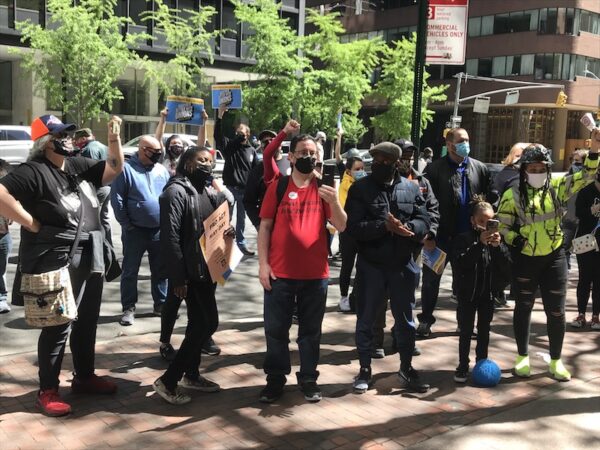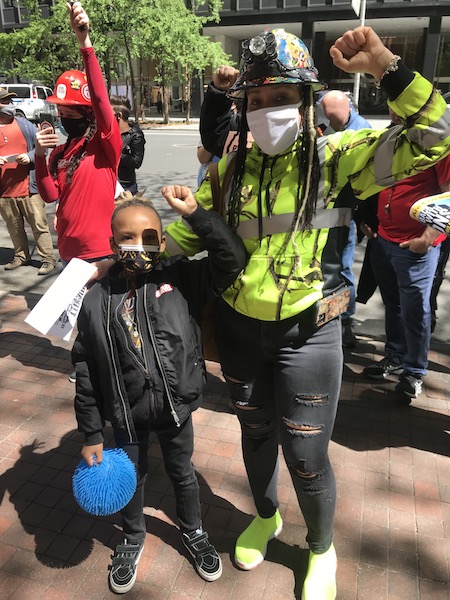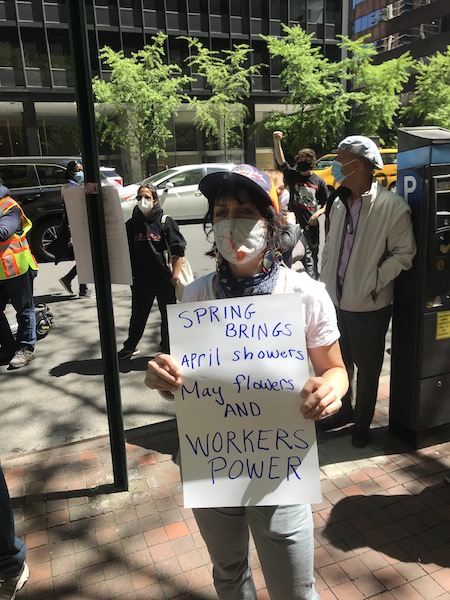
“This is not a rally against Schumer. It’s in support of the PRO Act,” Freddy Bastone of Building Trades for Workers Democracy told LaborPress. “Schumer says he’s going to push this. We want to make sure it happens.”
“What we want to do is to fight for it,” Percy Lujan of Laborers Local 78 told the rally.
Other actions May 1, included demonstrations outside the local offices of Sen. Patrick Toomey (R-Pa.) in Philadelphia and those of Sen. Josh Hawley (R-Mo.) in Kansas City. Hawley has made some rhetorical noises about being pro-labor, but as Missouri attorney general, he supported the state’s 2017 so-called “right-to-work” law banning the union shop, which was repealed by voters in 2018.
The PRO Act, which the House passed by a 225-209 vote on March 9, contains a host of provisions intended to make it easier for workers to form and sustain unions. Bastone told the rally that it would be “the most transformative piece of federal legislation in the last 40 years.”
It would allow workers to win union representation if a majority signed cards; outlaw “captive-audience meetings” where workers have to listen to anti-union messages; establish penalties for employers who fire union supporters; prohibit the permanent replacement of strikers; and repeal the parts of the Taft-Hartley Act of 1947 that ban “secondary boycotts” and allow states to prohibit the union shop.
“Labor has suffered under the Taft-Hartley Act for 70 years,” said Joel Herman, a retired member of International Brotherhood of Electrical Workers Local 3. “We’re asking to restore the New Deal.”
The PRO Act would outlaw employers’ worst union-busting abuses, said Troy Walcott, a Local 3 member who’s now been on strike at the Spectrum cable-TV company for more than four years: Spectrum has hired strikebreakers as permanent replacements, and is using them “to try and decertify a union they’re not even part of.”
Secondary boycott
For the building trades unions, repealing the secondary-boycott ban might be the bill’s most important provision. The large construction jobs that are their bread and butter in New York include workers from multiple unions and trades, employed by different subcontractors. But the Taft-Hartley Act prohibits unions from going on strike when the dispute doesn’t involve their direct employer — such as, for example, electricians or plumbers refusing to work if a different subcontractor hires nonunion laborers or ironworkers.
“That’s how we have solidarity, brothers and sisters,” said Local 3 member Meg Finn. “We honor each other’s struggles.”
“You saw what happened with Count Me In,” Bastone told the crowd.

The secondary-boycott ban stymied the “Count Me In” protests in 2017-18 against the Related Companies’ hiring “open shop” contractors, who used a mix of union and lower-paid nonunion workers, at the Hudson Yards development. Despite the large and loud crowds that turned out for pickets and protests, the unions couldn’t legally shut the job down.
In July 2018, the National Labor Relations Board ruled that Steamfitters Local 638 had violated the law when members briefly walked out to support demands that a contractor hire union sheet-metal workers. When Ironworkers Local 46 members protested the hiring of nonunion metallic lathers, they were limited to informational picketing, carrying signs that read “no dispute with any other employer.”
Those limits are the reason “you don’t see a wall of rats” at open-shop jobs, said Laborers Local 79 organizer Tafadar Sourov. If they were repealed, Joel Herman told LaborPress after the rally, “the union could shut down every open shop in the city.”
That is not lost on nonunion contractors. The Associated General Contractors trade association says the PRO Act “would create conditions where unions hold virtually all the leverage in collective bargaining with union firms and in efforts to unionize open-shop firms.”
Its fact sheet on the bill also screams, “THE PRO ACT WOULD NULLIFY RIGHT-TO-WORK LAWS.”
Senate filibuster likely
So far, 47 senators have signed on to the PRO Act. Three Democrats have not yet endorsed it, though: Mark Warner of Virginia and Mark Kelly and Kyrsten Sinema of Arizona.
“Every time I hear a politician speak, they say they’re for workers,” Laborers training instructor Christine Culpepper said. “If you say you’re for workers, you better prove it.”
Unanimous support from the 50 Democrats and independents would ensure a win if the bill came to a vote, even if no Republicans favored it, as Vice President Kamala Harris would break the tie. But getting a vote on it, however, is extremely unlikely as long as the Senate filibuster remains in effect.

Congressional Republicans have been highly hostile to the PRO Act. When the House passed an earlier version in 2020, then-Senate Majority Leader Mitch McConnell refused to hold committee hearings on it. Former House Education and Labor Committee chair Rep. Virginia Foxx (R-N.C.) calls it the “radical, job-killing PRO Union Bosses Act.” In March, the Senate Republican Policy Committee, headed by Roy Blunt (R-Mo.) said the bill would “boost unions’ power at the expense of workers and job creators.” He singled out “overriding state right-to-work laws, limiting Americans’ freedom to work as independent contractors, and allowing boycotts at businesses not involved in a labor dispute.”
If President Biden and Senate Democrats get the PRO Act passed, however, they will have accomplished something that failed at the high-water mark of postwar American liberalism, the three-year period from 1964 to 1966 in which Congress passed the Civil Rights Act, the Voting Rights Act, Medicare, Medicaid, the Head Start program, and the repeal of the immigration laws’ racist national-origins quotas. In 1965, the House voted to repeal Section 14(b) of the Taft-Hartley Act, the provision that lets states enact “right to work for less” laws, but a Senate filibuster blocked it.
“We need to be in solidarity with nonunion workers,” said Transport Workers Union Local 100 board member John Ferretti.
Wearing a “Smash Fascism — Build the Union” T-shirt, he also warned: “Just because Biden won and Trump was defeated doesn’t mean we can stay on the sidelines. We have to understand there is another Trump waiting in the wings if we don’t get real change for working-class-people.”



